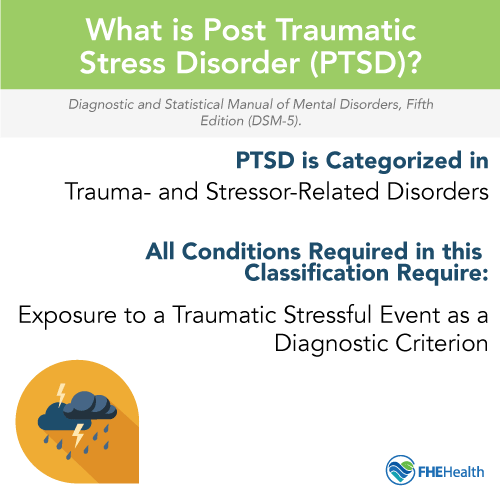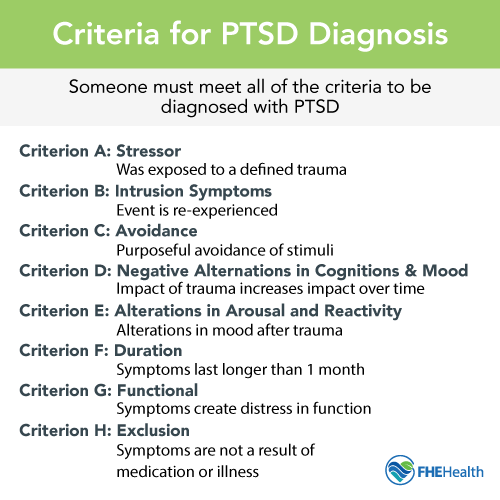
Negative experiences are an unfortunate reality of life. Sooner or later, most people will experience something like a car accident, the sudden loss of a loved one, a serious injury or a burglary. Statistically, 70 percent of Americans, or around 220 million people, have experienced some form of traumatic event in life. While many people can learn to move past these kinds of events, some situations go beyond our ability to cope. Without proper attention, a mental health disorder known as post-traumatic stress disorder may develop.
Post-traumatic stress disorder, or PTSD, is a condition triggered by severe stress, trauma or fear. Common in those who have served in the military, experienced an intense emotional or physical incident like assault or rape or gone through a serious incident such as a car crash or house fire, PTSD can be debilitating without proper treatment.
Care for PTSD can include elements like medication and intensive therapy to mitigate emotional responses and best improve the chances of a happy, healthy and stable future. At FHE Health, our mental health and PTSD treatment programs in Florida can help individuals process and move past traumatic events.
What Is PTSD?
 A form of anxiety disorder, PTSD arises in response to traumatic circumstances. After something like a debilitating accident, life-threatening illness, rape or sexual assault, battlefield experience, fire or another similar event, those involved may find themselves feeling stressed, paranoid, anxious and unable to focus. Memories of the moment in question may linger, creating uncomfortable emotions that are almost impossible to ignore. This can compromise virtually all elements of a normal life, creating an untenable situation.
A form of anxiety disorder, PTSD arises in response to traumatic circumstances. After something like a debilitating accident, life-threatening illness, rape or sexual assault, battlefield experience, fire or another similar event, those involved may find themselves feeling stressed, paranoid, anxious and unable to focus. Memories of the moment in question may linger, creating uncomfortable emotions that are almost impossible to ignore. This can compromise virtually all elements of a normal life, creating an untenable situation.
While not universal after a serious situation, PTSD reportedly occurs in around 20 percent of those who have suffered a distressing event. Unfortunately, many people who have PTSD either don’t realize there’s something wrong or are hesitant to speak up due to the stigmas surrounding mental health.
What Causes PTSD?
PTSD can be caused by a single traumatic event or a series of traumatic experiences. Some of the most common causes of this condition include:
Military Service
Military service can be enormously stressful. Factors such as witnessing or experiencing violence, geographical location, and other factors can contribute to the development of PTSD. The number of veterans suffering from this condition varies. As many as 11-20 veterans out of 100 of Operation Iraqi Freedom experienced PTSD. 15 of every 100 Vietnam veterans experienced the condition.
First Responders
First responders such as police, firefighters, and EMTs are at risk for developing PTSD because of their high-stress occupations. They are repeatedly placed in high-stress situations. A single acute event or multiple stressful events can lead to the development of this condition.
Sexual Trauma
People who experience sexual trauma as children or adults are more susceptible to PTSD. Some victims may develop symptoms right away or experience delayed reactions to their trauma.
Childhood Physical Abuse
The fear and stress associated with physical abuse in childhood can cause PTSD that extends into adulthood. Additionally, adults who experience physical abuse or domestic violence can also develop PTSD.
Threatened with a Weapon
Being threatened with a weapon like a gun or knife can trigger the development of PTSD. In these situations, people experience temporary powerlessness and acute stress that alters their mental well-being.
Other Factors
There are seemingly countless triggers for developing PTSD. Witnessing a violent event or the death of a loved one–even the death of a beloved pet—can be incredibly traumatic and lead to a mental health disturbance. Sometimes, PTSD can develop because an individual is already experiencing high stress or another mental health condition.
What are the Symptoms of PTSD?
PTSD can arise in numerous different ways and, as such, may manifest differently from person to person. The type of trauma in question may play a great role in side effects, adding an extra layer of difficulty in diagnosis and treatment. However, three main categories of symptoms are generally required for a clinical diagnosis. These are:
- Distressing recollections of the event in question, like nightmares, negative thoughts in response to a trigger, flashbacks, intrusive thoughts, and memories
- Emotional numbness and a disinterest in previously pleasurable activities and interactions, much as with a depression diagnosis
- Increased emotional arousal or fight or flight responses, including difficulty sleeping, mood swings and trouble sleeping
Those with PTSD may show signs like:
- Aggressive behavior
- Irritability
- Hypervigilance
- Exaggerated responses to stimuli
- Trouble concentrating
- Insomnia
Self-destructive behavior is also common in those with PTSD. Affected individuals may turn to coping methods like drinking or drug use and may lash out toward friends and loved ones. Isolation is also common, with individuals neglecting social activities and rejecting both romantic and platonic opportunities. Those with PTSD may also have trouble handling social, occupational and financial requirements for a normal life. Choosing to leave work or end relationships isn’t unusual in cases of PTSD.
When PTSD Symptoms Appear
Many people believe that if they feel normal after a critical situation, they’re okay. While this is possible, PTSD may not manifest right away. Signs can arise days, months or even years after experiencing trauma. This is very common in military personnel: the effects of war, injury or loss can be pushed down and ignored in the field but may come to the fore on return to civilian life. Between 20 and 30 percent of military members will develop PTSD at some point in life, whether during service or as a veteran.
It is common to experience frustration, fear, anxiety, worry or insomnia following a serious incident, and this should not be downplayed. After a serious occurrence, it’s natural to be hesitant or anxious about what occurred or to be afraid of something similar happening again. For many people, these feelings will lessen in several weeks. PTSD may be the culprit if they don’t. In general, symptoms following a traumatic event must persist for at least a month to be considered true PTSD.
What are the Treatments for PTSD?
 Due to the trauma associated with a PTSD diagnosis and the serious symptoms that arise, PTSD treatment is essential. Without treatment, PTSD can worsen, standing in the way of everything from personal relationships to employment. It can also lead to feelings of depression and increased suicide risk.
Due to the trauma associated with a PTSD diagnosis and the serious symptoms that arise, PTSD treatment is essential. Without treatment, PTSD can worsen, standing in the way of everything from personal relationships to employment. It can also lead to feelings of depression and increased suicide risk.
Medication and Therapy
In addressing PTSD, most patients respond best to a combination of medicine and therapy. Antidepressants are the most common medications offered for PTSD treatment, addressing feelings of isolation, anxiety, and depression. When used in conjunction with intensive therapy, patients may be able to return to a normal way of life.
Therapeutic Approaches
Therapy for PTSD can vary based on a patient’s specific needs as well as the preferences of a particular therapist. The most common therapeutic techniques include:
- Cognitive Processing Therapy: A specific form of cognitive behavioral therapy, CPT, can be very effective in treating symptoms of PTSD. CPT focuses on identifying the connections between thoughts and emotions, coupled with formal processing of traumatic experiences. Many courses of CPT include in-depth writing about the event in question, which can then be deconstructed in future sessions to redirect thoughts and feelings.
- Eye Movement Desensitization and Reprocessing: EMDR is a form of therapy that was created specifically to address trauma and centers around an underlying assumption that the symptoms of PTSD are based on a failure to appropriately process a trauma. Using a combination of controlled exposure to traumatic memories with alternating stimuli, like eye movement, participants are able to better cope with what occurred.
- Exposure Therapy: Exposure therapy helps to desensitize patients to painful or frightening memories by using images, video and virtual reality programs to recreate a traumatic incident. By providing increased exposure to the circumstances of a trauma, those with PTSD are better prepared to safely face the reality of a situation.
- Group Therapy: A common tenet in many PTSD treatment programs, group therapy can provide context and support for individuals with PTSD. When discussing experiences and feelings in a group setting, it can be easier for those participating to open up, reveal insecurities, get feedback and gain helpful insight.
Therapeutic methods can be combined for greater efficacy if desired. For example, group therapy is often incorporated into other courses of treatment. In both inpatient and outpatient programs for PTSD treatment, significant time is devoted to these kinds of therapies.

Mental Health Rehab for PTSD
While many people with PTSD pursue counseling in addition to daily life, those with severe PTSD or who are struggling to control symptoms are encouraged to attend a mental health rehab program.
Why Choose PTSD Treatment?
Rehabilitation is often associated with addiction, but this process can be equally effective for those working through mental health issues, including PTSD. With a supportive environment, trained medical professionals and an expert approach to therapy, it’s possible to see significant improvement in all elements of physical and mental wellness. By working with doctors, nurses and psychologists trained in therapy for PTSD, a rehabilitation program can provide proven techniques that improve the outcome of PTSD treatment.
Specialized PTSD Treatment Programs in Florida
At FHE Health, we are highly trained in mental health care, combining the medical, psychiatric and clinical components of PTSD treatment. Using a series of biometrics, we are able to use tools like brain imaging, blood testing and other techniques to create a customized approach to therapy to improve efficacy. Through our five-tier neuro-rehabilitative services, we are able to support PTSD treatments with opportunities like:
- Comprehensive neuro-psychological testing
- Heart rate variability and biosound monitoring
- Quantitative electroencephalography (qEEG)
- QEEG-guided neurofeedback training
- Electrical nerve stimulation therapy
- High-frequency pulsed electromagnetic stimulation therapy
PTSD is a serious condition, but the right help can make all the difference. At FHE Health, we are able to offer an inpatient environment devoted to alleviating symptoms. With the ability to enhance coping methods and improve mood and attitude, we can help those suffering through trauma to find hope for the future.
If you or someone you love is living with post-traumatic stress disorder, FHE Health can help. Making the decision to seek help isn’t always easy, but taking the first steps toward rehabilitation can make all the difference. Please contact us today at (833) 596-3502 to learn more about admission to PTSD treatment in Florida.
FAQs About PTSD Treatment
Q: I went through a traumatic event, but isn’t it normal to feel scared and anxious afterward? How do I know if it’s actual PTSD?
A: It’s normal to feel fearful, anxious, and worried after a traumatic incident. For many people, these feelings naturally lessen over a few weeks. The difference with PTSD is that the symptoms don’t go away and can be severe enough to disrupt your daily life. If distressing recollections, emotional numbness, or a constant “on edge” feeling persist for more than a month, it may be PTSD, and a professional evaluation is recommended.
Q: My trauma happened months or years ago. Is it possible for PTSD to show up this much later?
A: Yes, it’s actually very common for PTSD symptoms to surface long after the traumatic event. They can lie dormant for months or even years until an unrelated stressor in your life suddenly triggers them. The most important thing to remember is that it’s never too late to seek help and begin healing.
Q: I’ve heard PTSD causes flashbacks, but are there other symptoms to look for?
A: Flashbacks and nightmares are classic symptoms, but PTSD can manifest in many ways. It’s generally defined by three categories of symptoms:
- Re-experiencing the event: Through intrusive thoughts, memories, or nightmares.
- Avoidance & Numbness: Avoiding reminders of the trauma and feeling detached from others or losing interest in activities you once enjoyed.
- Increased Arousal: Feeling hyper-aware of your surroundings (hypervigilance), having angry outbursts, difficulty sleeping, or being easily startled.
Q: Can PTSD actually be treated, or is this something I just have to live with forever?
A: The most important thing for you to hear is that healing is absolutely possible. You don’t have to feel this way forever. The goal of treatment is to give you back your future, getting to a place where the memory is just a memory, not something that controls your daily life. Through either inpatient mental health therapy, outpatient mental health therapy, or a combination of both, you will learn to effectively manage your thoughts and emotional responses.
Q: What does treatment for PTSD actually involve? Is it just talking about what happened?
A: You might worry that therapy means talking about the past forever, but what it really does is build skills for your future. We’ll use proven methods to help your brain reprocess the memory and take back its control over you. Sometimes medication can also provide the stability needed to do that deeper healing work.
Q: My trauma doesn’t seem bad enough to qualify for actual PTSD. How do I know if it’s real?
A: You know it’s real if it’s disrupting your life. The official diagnosis of PTSD depends on the symptoms you’re experiencing, not the event that caused them. There is no ‘bad enough’ requirement to get help. If memories and feelings from the past are controlling your present, that’s all the qualification you need to seek support.








